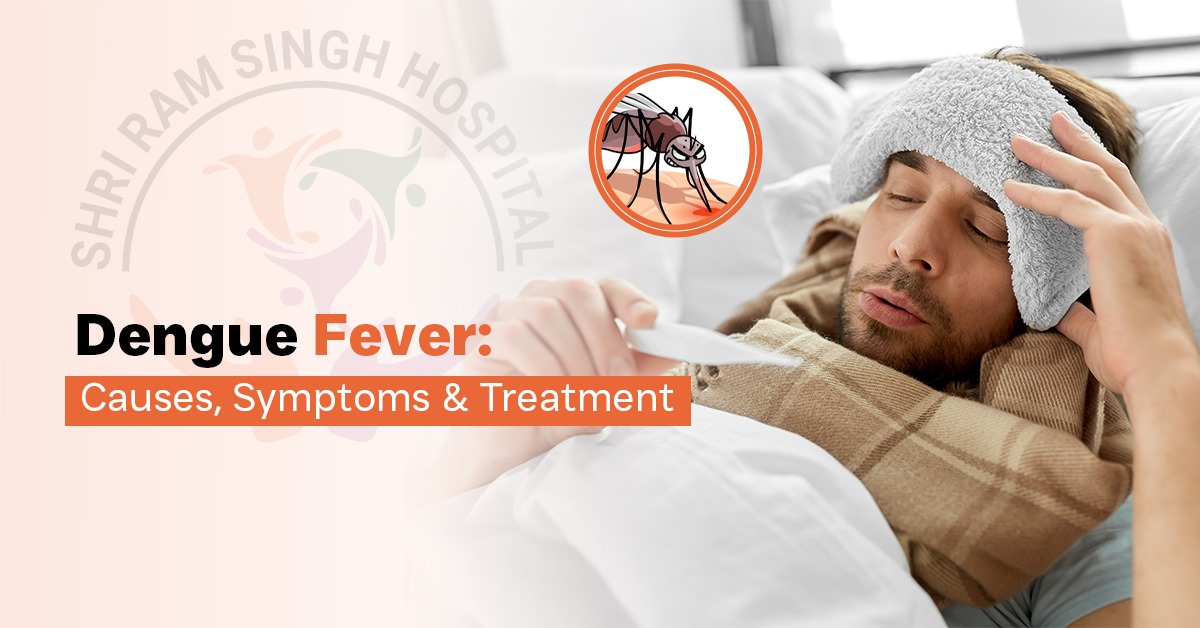Dengue fever is a mosquito-borne illness that has become a major health concern in many parts of the world, particularly in tropical and subtropical regions. Understanding the causes, recognizing the symptoms, and knowing the treatment options are essential for managing this potentially serious disease.
Here’s a comprehensive guide to dengue fever.
What is Dengue Fever?
Dengue fever is caused by the dengue virus, transmitted to humans through the bite of an infected Aedes mosquito, primarily the Aedes aegypti species. This virus has four distinct serotypes (DEN-1, DEN-2, DEN-3, and DEN-4), meaning a person can be infected up to four times, each time by a different serotype.
Causes of Dengue Fever
1. Mosquito Bites
The primary cause of dengue fever is the bite of an infected Aedes mosquito. These mosquitoes are typically found in urban and semi-urban areas and are most active during early morning and late afternoon.
2. Human-to-Mosquito Transmission
When a mosquito bites a person already infected with the dengue virus, it becomes a carrier and can transmit the virus to other humans it bites. This cycle perpetuates the spread of the disease.
Symptoms of Dengue Fever
Dengue fever can range from mild to severe. Symptoms typically appear 4-10 days after the mosquito bite and can last for 2-7 days. Recognizing the symptoms early is crucial for effective management.
1. High Fever
A sudden high fever, often reaching up to 104°F (40°C), is one of the first signs of dengue fever. The fever can come on rapidly and may last for several days.
2. Severe Headache
Intense headaches, particularly around the forehead and behind the eyes, are common and can be debilitating.
3. Joint and Muscle Pain
Severe joint and muscle pain is a hallmark of dengue fever, giving it the nickname “breakbone fever.” This pain can make movement difficult and uncomfortable.
4. Nausea and Vomiting
Persistent nausea and vomiting are frequent symptoms, which can lead to dehydration and exacerbate the patient’s condition.
5. Skin Rash
A rash may develop a few days after the fever starts. This can appear as red spots or blotches and often spreads across the body.
6. Bleeding
In severe cases, dengue fever can cause bleeding from the gums or nose, or easy bruising, indicating a more dangerous form of the disease known as dengue hemorrhagic fever.
7. Fatigue and Weakness
Even after the acute phase of the fever subsides, prolonged fatigue and weakness can persist, requiring extended rest and recovery.
Also Read: Typhoid Prevention: Vaccines, Hygiene, and Travel Tips
Treatment of Dengue Fever
There is no specific antiviral treatment for dengue fever, but early diagnosis and proper medical care can significantly improve the outcome. Here are key treatment approaches:
1. Symptomatic Relief
Fever and Pain Management: Acetaminophen (paracetamol) is recommended for reducing fever and relieving pain. Avoid aspirin and non-steroidal anti-inflammatory drugs (NSAIDs) as they can increase the risk of bleeding.
Hydration: Maintaining fluid intake is critical to prevent dehydration. Oral rehydration solutions, electrolyte drinks, and plenty of water are essential.
2. Medical Care
Hospitalization: In severe cases, hospitalization may be necessary for close monitoring and supportive care, including intravenous (IV) fluids and electrolytes.
Blood Transfusions: If dengue hemorrhagic fever develops, blood transfusions may be required to manage severe bleeding and maintain platelet levels.
Prevention of Dengue Fever
Preventing dengue fever largely involves reducing mosquito exposure and breeding. Here are some effective preventive measures:
Use Mosquito Repellents: Apply repellents containing DEET, picaridin, or oil of lemon eucalyptus to exposed skin.
Wear Protective Clothing: Long-sleeved shirts and long pants can help protect against mosquito bites.
Use Mosquito Nets: Sleeping under nets, especially in dengue-endemic areas, provides an additional layer of protection.
Eliminate Standing Water: Mosquitoes breed in stagnant water. Regularly empty and clean containers that collect water, cover water storage units, and ensure proper drainage around your home.
Platelet Apheresis for Dengue Hemorrhagic Fever
Dengue hemorrhagic fever can cause a dangerous drop in platelet levels, leading to severe bleeding. In such cases, platelet apheresis may be recommended. This procedure involves extracting platelets from a donor’s blood and directly infusing them into the patient, helping restore normal platelet levels and prevent complications like internal bleeding. Shri Ram Singh Hospital is equipped with advanced platelet apheresis technology, ensuring that patients receive the most effective treatment quickly and efficiently. Our expert hematology team carefully monitors the patient’s progress to ensure optimal recovery.
Stay in Hospital for Dengue Treatment
In severe cases of dengue, hospitalization becomes crucial. A stay in the hospital ensures that patients receive close monitoring, especially when symptoms escalate to dengue hemorrhagic fever or dengue shock syndrome. Continuous supervision by medical professionals allows for timely interventions, such as intravenous (IV) fluid therapy to combat dehydration and maintain electrolyte balance. For patients experiencing severe bleeding or organ impairment, a hospital stay provides access to life-saving treatments such as platelet transfusions and constant monitoring of vital signs. At Shri Ram Singh Hospital, we ensure that all dengue patients receive personalized care and comfort during their hospital stay, minimizing complications and promoting swift recovery.
When to Seek Medical Help
If you suspect dengue fever, especially if severe symptoms like persistent vomiting, severe abdominal pain, difficulty breathing, or bleeding appear, seek medical attention immediately. Early intervention can prevent complications and ensure a better prognosis.
Shri Ram Singh Hospital is committed to providing comprehensive care for dengue fever and other infectious diseases. Our expert medical team is equipped to diagnose and treat dengue fever, ensuring you receive the best possible care. Stay informed, stay safe, and prioritize your health.

